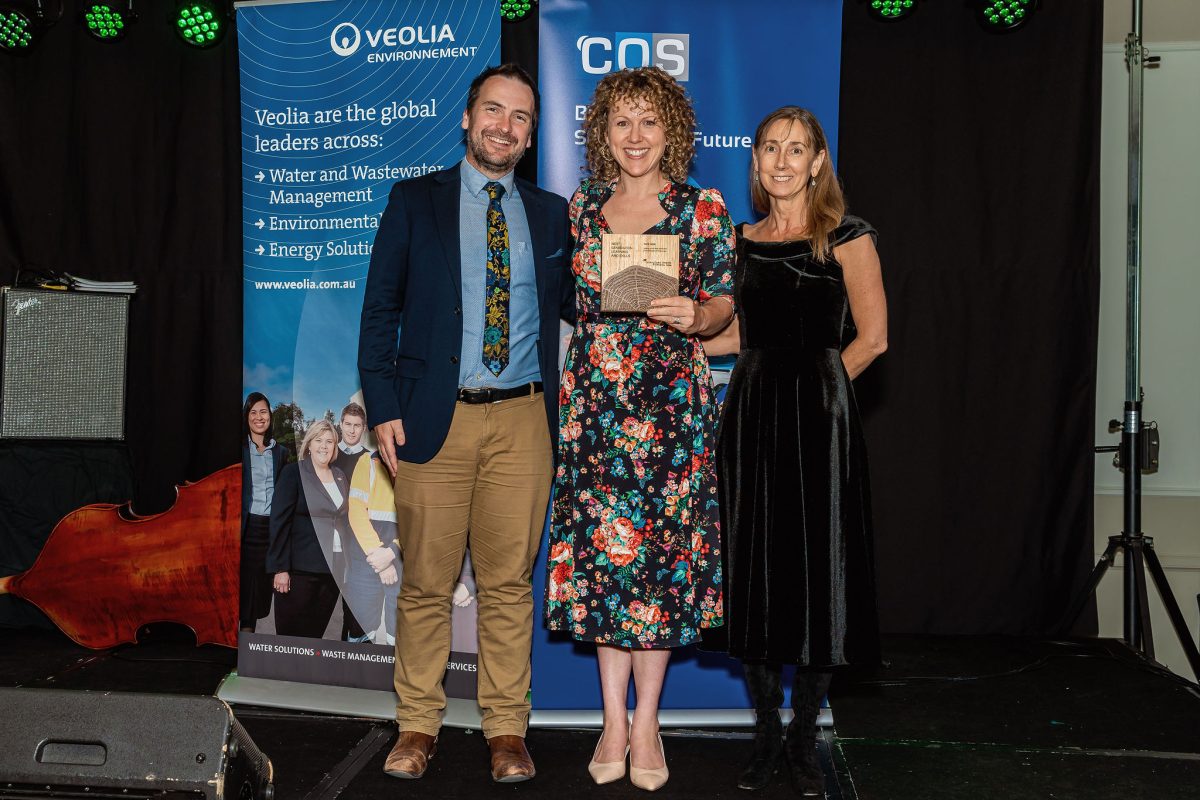
TAFE NSW’s Paul Hover, Belinda Bean and Suzanne Davis accept the winning plaque for the Next Generation Learning and Skills category at the Green Gown Awards Australasia. Photo: NSW TAFE.
Thurgoona’s TAFE NSW National Environment Centre has been recognised for its work in training the next generation of sustainability leaders, earning a gong in the prestigious Green Gown Awards Australasia.
The awards recognise excellence in promoting sustainability in the tertiary education sector and TAFE NSW was honoured for its Diploma of Sustainable Practice. The training provider is now a finalist in the 2025 International Green Gown Awards.
Teachers Dr Ali Mitchell and Belinda Bean said they were over the moon at the win announced in November and still “on a high”.
“We are so proud to be a Green Gown Award winner and do our part to preserve the planet and create a better future for the next generation,” said Belinda.
“The world is facing unprecedented environmental, social and economic challenges so the need for leaders in sustainable practice who can drive real change quickly is more urgent than ever.
“That’s why TAFE NSW created the Diploma of Sustainable Practice. It is the only higher-education qualification in Australia accredited by the International Society of Sustainability Professionals.
“The combination of theory and practical project-based work ensures we produce work-ready graduates who are immediately valuable to the global sustainability sector.”
Dr Mitchell designed the program for TAFE NSW in 2016 and implemented it in 2017. She said the course had gone from strength to strength with enrolments increasing alongside the recognition by business and organisations to implement better practices.
When you graduate, you are known as a generalist sustainability professional, a role becoming more sought after by industry.
“There are a number of reports that are basically saying we can’t get enough sustainability professionals and so when we do, they’re pretty well naming their price,” said Dr Mitchell.
She said LinkedIn’s Global Green Skills Report found sustainability managers enjoyed the largest jump in job openings in the sector between 2016 and 2021, growing 24 per cent nationally.
“Sustainability is an umbrella industry and it applies to every role, every organisation, whether that be a business, community or whatever, and today people understand that it is something they need to be doing,” she said.
”For a long time, it was a bit of an add-on, but it actually needs to be a part of core business.
“The business case for sustainability is overwhelming and organisations will have greater longevity and their bottom line is usually much better, and that sort of message is getting out there.”
The course is learner-centred and project-based, which means how you achieve the required outcomes is up to you.
“Students can focus on their own area of interest in their own organisational context and they do a real-world project which has real-world impact,” Dr Mitchell said.
So far, students have delivered 150 unique projects.
“The generalist sustainability professional is really a change agent or a change manager with a focus on sustainability and sustainable practices,” Dr Mitchell said.
“As a generalist, you are basically a ‘jack of all trades, master of none’ and being an expert in what you need to be, when you need to be an expert in it. The knowledge and skills students gain from this course mean they can go into any organisation and improve it.”
As an environmental scientist with 20 years spent with CSIRO, Dr Mitchell, who also completed a Graduate Certificate in Natural Resource Management, Policy and Planning, said the progression to teaching was a natural move for her. She was doing sustainability projects early in her career without even knowing she was doing them.
She has lectured at Charles Sturt University and began a part-time role with TAFE in 1999.
“Sustainability professionals are not your hippies, yuppies, greenies or whatever,” she said.
”We are actually very pragmatic and we know that our organisation, if it’s not economically sustainable, it can’t be doing social or environmental sustainability either.
“Sustainability is a journey. It often starts with the environmental stuff and as an organisation progresses, they’ll move into social areas like procurement.
”The ultimate goal is to put everything through the sustainability lens and embed the ethos that it doesn’t matter who comes here, they behave sustainably.”
According to TAFE NSW, a recent study also found more than half of Australian consumers now consider sustainability an extremely or slightly important purchase criterion when shopping.
Original Article published by Vanessa Hayden on Region Riverina.


